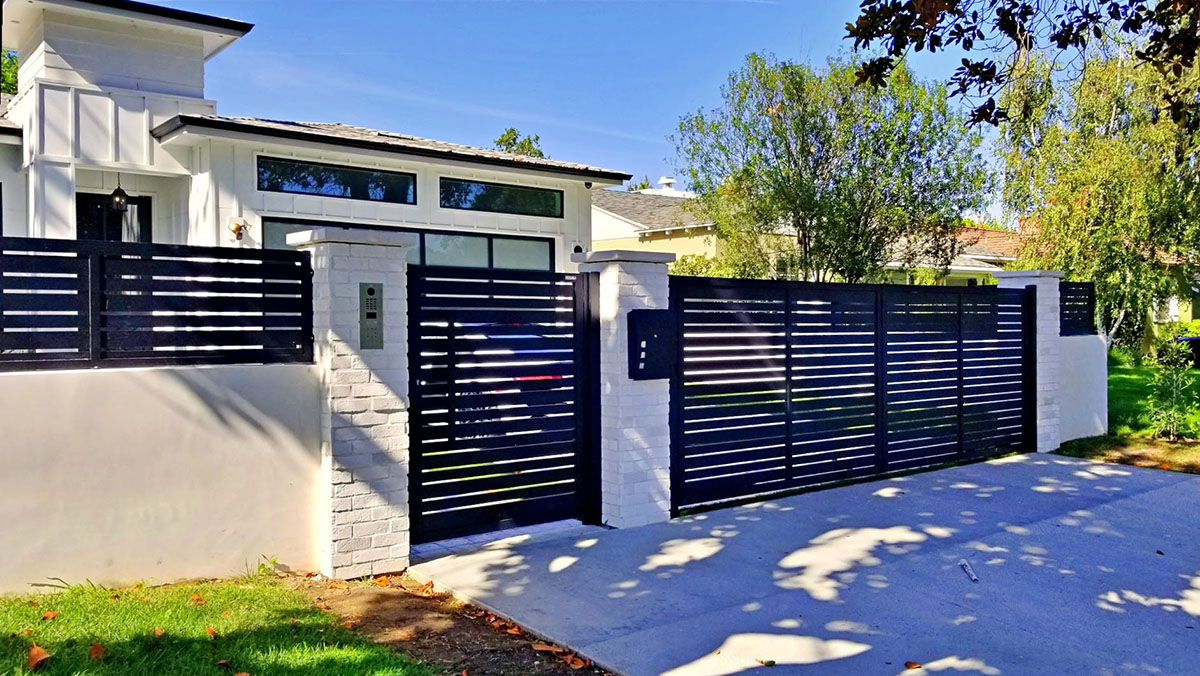All Categories
Featured

When it pertains to picking the ideal fence product for longevity, wrought iron sticks out as one of one of the most resilient and trusted choices readily available. Recognized for its stamina, aesthetic allure, and capacity to endure numerous weather conditions, wrought iron is a popular choice for both domestic and industrial residential or commercial properties. But just how does it compare to various other fence products in terms of long life and performance? Allow's take a better look at wrought iron secure fencing and how it compares to options like timber, plastic, and light weight aluminum.
Toughness and Longevity of Wrought Iron Secure Fencing. Wrought iron is a solid, durable material that's made to last for years, otherwise longer. Unlike lots of other secure fencing choices, wrought iron can withstand harsh environmental problems, consisting of severe warm, hefty rain, and even strong winds. This makes it an exceptional selection for residential properties located in areas with unforeseeable climate. Due to the fact that it is a metal, wrought iron is not susceptible to the deterioration that timber fences often experience, such as rotting, bending, or insect problems.
Toughness: Wrought iron fencings are incredibly difficult and can stand up to influences and various other kinds of physical tension that could damage various other materials. When correctly maintained, they can last for half a century or even more, making them a financial investment that will certainly give lasting worth.
Wrought Iron vs. Timber Fencing. Wooden fencings, while conventional and visually pleasing, generally require even more maintenance and have a shorter life-span compared to wrought iron. Wood is susceptible to rot, termites, and weathering over time, every one of which can jeopardize its structural stability. On top of that, timber fences may need to be changed or fixed every 10 to twenty years, depending on the environment and the kind of timber used.
Upkeep: While wood fences need to be consistently treated with sealants, paints, or discolorations to maintain their appearance and durability, functioned iron fences normally need much less upkeep. They might require occasional cleaning or repainting to stop rust, especially in seaside or moist areas, however they won't struggle with the exact same kinds of degradation as timber.
Durability: While a properly maintained wood fence may last 20 to thirty years, functioned iron can exceed that life-span by several years, making it an extra durable choice over time.
Wrought Iron vs. Plastic Secure fencing. Plastic fence has actually ended up being a popular alternative to timber because of its low upkeep and resistance to the components. Unlike wood, plastic does not rot or warp, and it doesn't need to be repainted or treated. Plastic can end up being brittle over time, particularly in regions with extreme wintertimes or severe UV direct exposure. It may damage or split under stress, such as from a heavy impact or a severe tornado.
Resilience: While vinyl is immune and rather sturdy to rot and fading, it still can not match the long-lasting strength and strength of functioned iron. A plastic fencing may last around 20 to three decades, depending on ecological elements, however it does not have the architectural integrity that wrought iron gives.
Maintenance: Vinyl requires minimal maintenance compared to timber, yet it can still fade with time, specifically in locations with extreme sun exposure. Wrought iron might need occasional rust prevention treatments yet generally calls for less interventions than vinyl.
Wrought Iron vs. Light Weight Aluminum Fence. Light weight aluminum is another steel option to functioned iron, and while it shares a few of the longevity attributes of functioned iron, it is normally much less durable and strong. Light weight aluminum is more resistant and light-weight to corrosion and corrosion, making it a preferred option for low-maintenance secure fencing. It's not as strong as functioned iron and might be a lot more susceptible to bending or nicking under pressure.

Longevity: Wrought iron is substantially stronger and more long lasting than light weight aluminum. While light weight aluminum fences can last for a number of years, they may not hold up too in high-traffic or high-impact areas. In comparison, wrought iron is much more resistant to physical damage and can better hold up against pressure and force.
Upkeep: Both wrought iron and aluminum fences call for some maintenance, largely to avoid corrosion. Nonetheless, light weight aluminum is much less most likely to rust than functioned iron, making it a much more low-maintenance option in locations with high moisture or seaside salt direct exposure.
Last Ideas: Wrought Iron's Sturdiness Advantage. Wrought iron attracts attention as one of the most long lasting fencing materials offered, outshining wood, plastic, and light weight aluminum in regards to toughness, longevity, and total performance. While it does need occasional maintenance, especially to stop rust, its ability to stand up to extreme climate condition, physical stress, and the examination of time makes it an outstanding investment for organizations and property owners seeking a long-lasting, protected fence solution.
For those that focus on strength and long life above all else, functioned iron is an unbeatable selection. Whether you're safeguarding a home, boosting the look of your backyard, or providing security for a business website, functioned iron secure fencing will certainly offer decades of toughness and aesthetic allure that couple of other products can match.
Latest Posts
Find Affordable Auto Repairs with Montclare’s Limited-Time Service Specials
Published May 29, 25
1 min read
Learn About Auto Services & More: Complete Services Guide from Montclare Auto Repair
Published May 26, 25
1 min read
Discover Special Auto Repair Deals in Chicago at Montclare Auto Repair
Published May 25, 25
1 min read
More
Latest Posts
Find Affordable Auto Repairs with Montclare’s Limited-Time Service Specials
Published May 29, 25
1 min read
Learn About Auto Services & More: Complete Services Guide from Montclare Auto Repair
Published May 26, 25
1 min read
Discover Special Auto Repair Deals in Chicago at Montclare Auto Repair
Published May 25, 25
1 min read